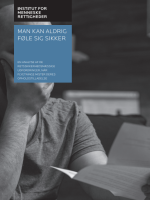
You can never feel safe
In this report, the Danish Institute for Human Rights examines the due process rights of refugees during the revocation process in Denmark.
On the basis of this analysis, we have identified a number of due process issues during the revocation process. In particular, we have focussed on issues relating to:
• The authorities’ assessment of refugees’ attachment to Denmark
• Guidance and information during the revocation process
• Refugees’ right to be consulted in their case
• Processing times.
The report consists of a human rights law analysis of the criteria used in revocation cases, an administrative law analysis of case processing and a qualitative analysis of the experiences of Syrian refugees, based on interviews with 23 persons affected by the process.
"The paradigm shift"
In 2015 and 2019, the Danish government introduced a series of legislative changes that have fundamentally changed Danish asylum practice – referred to as a ‘paradigm shift’.
Residence permits are now granted with a view to returning refugees to their country of origin as soon as possible, not with a view to integration and long-term residence.
Denmark’s strong focus on the revocation of refugees’ residence permits is unique when compared to other EU countries, and Danish asylum rules provide a significantly lower level of protection for some refugees than that which follows from EU asylum rules in other member states.
In 2019, as a means to implement the paradigm shift, the Danish Immigration Service began reviewing the residence permits of refugees from Damascus and later Rif Damascus in Syria. More than 1,000 Syrian refugees have had their residence permits reviewed, and more than 100 have had their residence permits finally revoked.
When refugees lose their residence permits, they lose the right to live and work in Denmark and risk being separated from their family.
Since Denmark does not have diplomatic relations with Syria, refugees are not forcibly deported at present. In the next few years, the Danish authorities are expected to review the residence permits of refugees from other areas of Syria, as well as refugees from other countries.
Due to the paradigm shift, many refugees in Denmark currently live under conditions that are characterised by a much higher degree of temporariness, uncertainty and insecurity than before.
For refugees at risk of having their residence permits revoked, these legal changes are particularly hard-hitting, primarily because the decision resulting from the revocation process has a very significant impact on the lives and futures of those involved. When refugees lose their residence permits, they lose the right to live and work in Denmark and risk being separated from their family.
At the same time, the revocation process is complicated and often lengthy which, in itself, can be extremely stressful for those involved, whatever the outcome. Many refugees suffer physical and psychological harm in the process. Some lose their jobs; others have to stop their education.
The intrusive nature of the revocation decision and the stressful consequences of the process, combined with the fact that the Danish standards for revocation are considerably lower than in other EU countries, makes it especially important to ensure that due process is guaranteed throughout the process.
The Danish Institute for Human Rights recommends that:
- The Danish Immigration Service ensure a thorough human rights assessment of the right to respect for private and family life under Article 8 of the ECHR in cases concerning adult children and children’s independent attachment to Denmark, respectively.
- The Ministry of Immigration and Integration take the initiative to amend the competence rules under the Aliens Act so that the Refugee Appeals Board handles the revocation cases of both refugees and their family members, with the aim of ensuring a comprehensive assessment of family life as required under Article 8 of the ECHR.
- The Danish Immigration Service provide written information to the refugees concerned – and any family members – in both their native language and in Danish during the revocation process in order to help the parties involved to understand the process and to ensure compliance with the duty to provide guidance.
- The Danish Immigration Service adjust its invitation and decision letters to refugees and family members with the aim of providing sufficient information and avoiding misunderstandings.
- The Ministry of Immigration and Integration take the initiative to examine the processing times in revocation cases at the Danish Immigration Service, the Refugee Appeals Board and the Immigration Appeals Board to determine whether they are acceptable.
We strive to make the pdf versions of our publications etc. accessible for screen readers. If you experience any problems, please contact Digital Editor Stine Juhl Nielsen on stni@humanrights.dk
